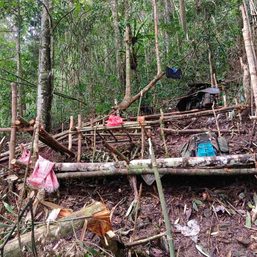SUMMARY
This is AI generated summarization, which may have errors. For context, always refer to the full article.
![[New School] Is CASER the solution to the CPP-NPA?](https://www.rappler.com/tachyon/2023/12/caser-solution-cpp-npa-december-20-2023.jpg)
On November 28, a joint statement from the Philippine government and the National Democratic Front of the Philippines was issued in Oslo, marking a renewed effort to address the world’s longest communist insurgency. This is about six years since negotiations broke down between the two parties, and then-President Rodrigo Duterte issued Executive Order No. 70. The EO implemented a comprehensive strategy to suppress the rebellion, establishing the National Task Force to End Local Communist Armed Conflict (NTF-ELCAC), notorious for its red-tagging campaigns.
One can only hypothesize the basis of President Bongbong Marcos for his renewed interest in opening negotiations. Perhaps it stems from the loss of reputation and integrity of the NTF-ELCAC, especially when its former spokesperson, Lorraine Badoy, was held in the House of Representatives for contempt for lying. It might also be a response to the repeated unfulfilled promises by the Armed Forces of the Philippines (AFP) to quell the revolutionary forces of the CPP-NPA annually from 2018 to 2023.
Despite the unclear motivations, it is crucial to underscore the significance of these peace negotiations, as highlighted in the Oslo statement. The aim is to forge a path toward unity among the Filipino people, enabling them to live in peace and prosperity. One way this can be achieved, at least on the part of the NDFP, is the implementation of CASER, the often-cited document in every round of peace talks since the fall of the Marcos dictatorship.
The Comprehensive Agreement on Socio-Economic Reforms, or CASER, has its roots in the peace process back in 1998, when an agreement between the Ramos government and the NDFP was struck, known as the Comprehensive Agreement on Respect for Human Rights and International Humanitarian Law, simply known as CARHRIHL.
According to the NDFP, the CASER is the second step in a four-part plan for the cessation of hostilities between the AFP and the CPP-NPA. When CARHRIHL was signed and ratified, the next step would have been the implementation of socio-economic reforms, which are centered on genuine agrarian reform and national industrialization. However, negotiations broke down and hostilities resumed at the end of the Ramos presidency and the beginning of Estrada’s.
For the revolutionary groups, a genuine agrarian reform aims to redistribute vast arable land in the country, which they allege as mostly owned by landlords and mining corporations, back to the farming sector. This is especially more urgent for them since the implementation of the Rice Tariffication Law, which welcomed the influx of imported crops and rice towards the Philippines, crippling thousands of farmers in the countryside.
Since the Rice Tariffication Law is contradictory to the policies of CASER, it is likely that the NDFP negotiating panel would discuss for the law to be repealed, and suggest an alternative program that would instead strengthen the agricultural industry of the country. Progressives draw comparison to the rise of Vietnam when it proclaimed victory against the United States at the height of the Cold War, where the country built a strong foundation on its agricultural sector and promoted rice farming. As of today, Vietnam is now one of the leading exporters of rice in Southeast Asia, eclipsing the Philippines.
On the other hand, the concept of national industrialization will be implemented alongside and after genuine agrarian reform. The CASER proposed by the NDFP posits the idea of harnessing the labor population of the country, a significant portion of which often leave to become OFWs, in order to stimulate growth as a prospective industrial powerhouse in the Southeast Asia. A part of this package would also include the implementation of a national minimum wage, which faces adamancy from the government.
In reality, negotiations on CASER will be exhaustive. At present, it remains a concept that may be presented in the long-sought peace negotiations between the government and the NDFP. The promises of genuine agrarian reform and national industrialization as proposed by the revolutionaries may even be rolled back in order to accommodate for a better compromise with the government.
However, the presentation of CASER by the NDFP challenges the perception that the communist rebellion is a mere barbaric and terrorist movement. Beyond its promises lies a reflection on the social realities of the Philippines, even more so truthfully as we lag behind our fellow Southeast Asian neighbors.
It is high time to face the fact that perhaps the reason why we have the longest-running communist resistance in the world is because we also have one of the longest-running stagnations, from social policies to the economy. It is correct to change course and abandon the purely military approach against the CPP-NPA, especially the “local level peace talks” and the whole-of-nation approach, both of which are marred with allegations of harassment and killings, and instead aim towards a more diplomatic solution for prosperity and lasting peace. – Rappler.com
Carwyn Candila was the National Spokesperson of the League of Filipino Students, the leading anti-imperialist youth organization, from 2021 to 2022.
Add a comment
How does this make you feel?




![[OPINION] The CPP-NPA’s 3rd Rectification Movement is bad news to the peace process](https://www.rappler.com/tachyon/2024/01/tl-cpp-npa-peace-talk-rectification.jpg?resize=257%2C257&crop=366px%2C0px%2C1080px%2C1080px)

There are no comments yet. Add your comment to start the conversation.